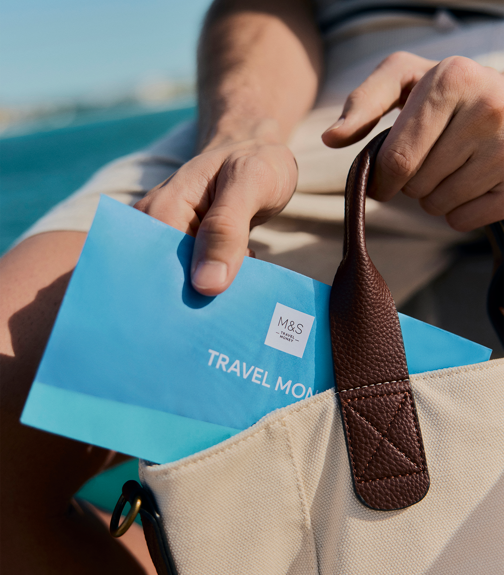How to buy Turkish Lira
-
Buy Turkish Lira Online
Buy Turkish Lira online with Click & Collect at over 580 M&S stores. Use our Pounds to Turkish Lira (GBP to TRY) currency calculator to work out how many Turkish Lira you want. Pick your collection date and collect from your chosen M&S store.
Click & Collect Turkish Lira (TRY) in as little as 60 seconds.*
*Subject to availability
-
Buy Turkish Lira In-store
Buy Turkish Lira in your local participating M&S store.* With over 90 Travel Money Bureaux nationwide - many open seven days a week. - you can buy Turkish Lira at a time that suits you.
*In-store rates may differ from online rates.

Why buy Turkish Lira from M&S Travel Money
There’s something for everyone in Turkey, whether it’s relaxing in a traditional Turkish bath, relaxing by the Aegean coast or exploring the country’s incredible archaeological treasures.
Get your trip off to a great start with a quick and easy British Pound to Turkish Lira currency exchange. With M&S Travel Money, you can expect:
- Our Turkish Lira rate has no hidden fees & zero commission
- Click & Collect Turkish Lira the same day*
- Stores open 7 days a week**
- Get more with Sparks Preferential Rates
**store opening hours vary

What you need to know about the Turkish Lira currency
The Turkish Lira (TRY) is the official currency of Turkey.
The currency unit 'Lira' comes from 'libra', the Roman unit of weight. The Lira was first introduced in 1844 as the Ottoman Lira. Following Turkey's independence in the 20th century, the Ottoman Lira was renamed the Turkish Lira.
The Turkish Lira uses the code TRY and is divided into 100 kurus.
Turkish Lira comes in both coins and banknotes.
Coins include:
1, 5, 10, 25 and 50 kurus
TRY1
Banknotes include:
TRY20, TRY50, TRY100, TRY200
You can buy Turkish Lira online using our Click & Collect service.
^^Please note not all denominations are available to exchange.

Guide to Turkey
If you're hoping to cross both mainland Europe and Asia off your travel bucket list, Turkey might be the perfect destination for you!
The city of Istanbul bridges Europe and west Asia, and the blend of culture has created some incredibly unique architecture. For history lovers, the Roman ruins of Ephesus and the Antalya Archaeological Museum give great insight into Turkey's past.
Turkey is also renowned for tea and coffee. If you find yourself in a traditional Turkish teahouse, you'll definitely need some Travel Money to pay for your hot drink.
FAQs about travelling to Turkey
Credit and debit cards are widely accepted across Turkey, particularly in large cities and tourist areas. It’s always advisable however to travel with both cash and cards, covering you for all eventualities. Smaller businesses like teahouses and cafés will usually prefer payments in cash, and if you're visiting a market or bazaar, you should bring some Travel Money and expect to haggle for the right price.
You may occasionally be able to use euros (EUR) in tourist hotspots like Istanbul and Bodrum, but this shouldn’t be relied on and it's always best to pay in Turkish Lira, as paying in the local currency protects you from any additional fees.
UK citizens can visit Turkey without a visa for up to 90 days in a 180-day period.
If you want to stay longer or earn money, you'll need to apply for an appropriate visa or work permit.
Non-UK passport holders should check the entry requirements with your country's embassy.
You should always research the most up to date visa guidelines before planning a trip.
It's normal to tip in Turkey for excellent service in restaurants or bars.
Tipping between 10% and 20% of the total bill is a good way to show your appreciation. You can also leave a cash tip of about TRY10 for other workers, including:
- Hotel workers
- Cleaning staff
- Spa attendants
- Bath attendants
- Salon workers
- Taxi drivers
The official language of Turkey is Turkish, and it's the most widely-spoken language across the country. Turkey is also home to a large Kurdish minority, so you may hear Kurdish and Zaza on your travels.
Other languages widely recognised in Turkey include:
- English
- Arabic
- French
- German
- Balkan languages (e.g. Bulgarian, Greek, Bosnian)
Turkey is rich in natural beauty and history, but it can also be home to extreme weather. Mountainous regions can experience unpredictable weather, with bushfires and floods being common.
You can visit the Foreign, Commonwealth & Development Office (FCDO) for the latest government travel advice for Turkey.
Like any destination, the best time to visit Turkey will depend on what you want to do and the kind of weather you prefer.
If you want to explore the historical side of Turkey, consider visiting between April and mid June. The weather is usually pleasant during this period, making it ideal for sightseeing and visiting historical sites.
Turkish summers are hot, particularly in coastal areas, so if you want a beach holiday, this is the perfect time to visit the Turkish Riviera or the Mediterranean coast. Major cities may be more crowded during this time, so you may need to book in advance to secure your holiday!
It's best to buy your Turkish Lira ahead of your trip to Turkey. This way, it helps secure better rates and avoid spending holiday time searching for bureaux de change. Don't wait until the airport to get your Travel Money, as exchange rates could be worse there than online or on the high street.
Yes, you can use contactless in Turkey, although you could risk fees, charges, and poorer exchange rates associated with making card payments abroad. You should also bear in mind that Turkey is a largely cash-based society, so it's important to always have cash Turkish Lira on hand.
Both are correct! Turkiye is the traditional Turkish spelling, and in 2022 the country asked the United Nations to refer to it as Turkiye in official contexts. The move was made to better reflect Turkish culture and values.
You can only use the Turkish Lira (TRY) in Turkey and the Turkish Republic of Northern Cyprus (TRNC), where it's the official currency.
Other popular currencies
If you’re planning a future holiday or a trip that takes in multiple destinations, these other currencies may be useful:


